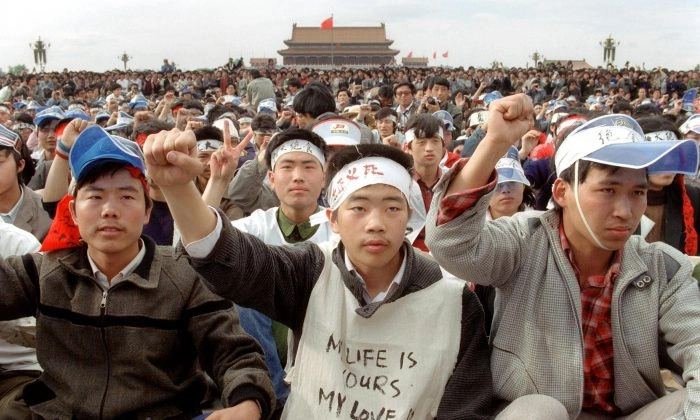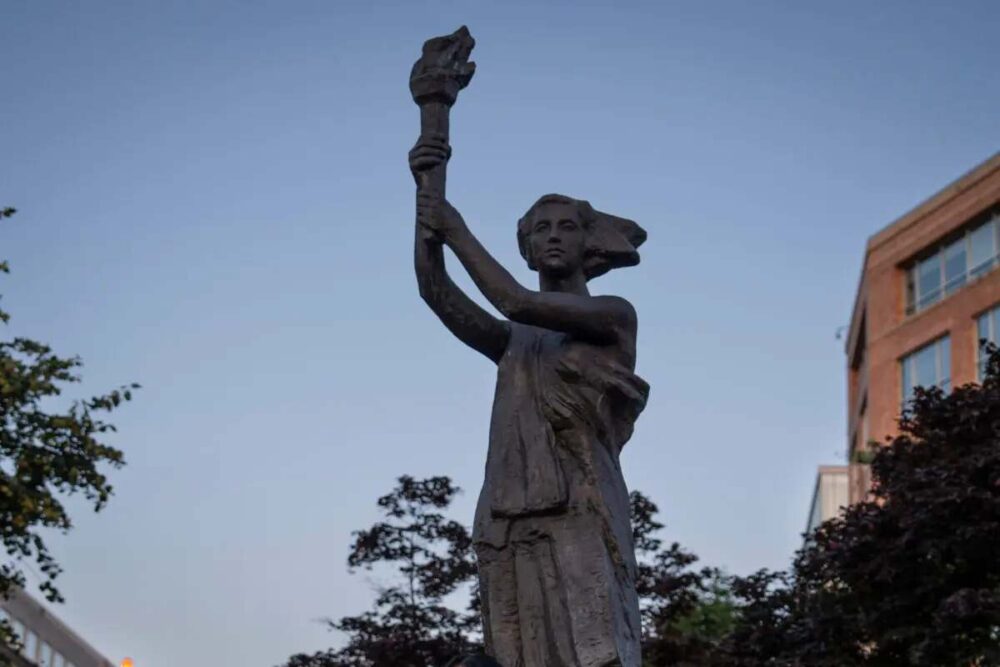
Students from Beijing University gather with thousands of other during a huge demonstration at Tiananmen Square as they start a hunger strike as part of the mass pro-democracy protest against the Chinese regime on May 18, 1989. (Catherine Henriette/AFP/Getty Images)
When troops rolled into Beijing and Chinese authorities on loudspeakers told everyone to stay home, Yuan Hongbing did the opposite, and jumped right into the center of the action.
Amid screams, gunshots, and tanks, Mr. Yuan ran between hospitals and Tiananmen Square, carrying the injured on his back.
On the square’s edge, military tanks chased several fleeing student protesters, smashing their bodies against a metal fence by the road curb.
One of them, even at death, was still holding a flag with both hands.
The blood gushing out sounded louder than the rumbling tank engines, said Mr. Yuan, whose own shirt was soaked with the blood from people he tried to rescue.
“This is the brutality of the CCP,” he told The Epoch Times, using the acronym for the Chinese Communist Party.
The estimated death toll ranges from hundreds to thousands, although a declassified 2017 British cable put the number as high as 10,000.
Defiance
Mr. Yuan, a law professor at Peking University at the time, has since escaped China after spending half a year in detention over his activism.
Many others who survived suffered retaliation, losing coveted careers and facing continued surveillance from Chinese police.
The issue remains today one of the most heavily censored topics in China, with authorities detaining activists or putting them under house arrest ahead of the anniversary in a bid to prevent them from commemorating the event.
Internet censors are also watchful for keywords related to the incident.
In Hong Kong, the annual vigil that once drew as many as 180,000 people at its peak vanished as the regime tightened its grip.

People commemorate the June 4, 1989, Tiananmen Square Massacre at the Victims of Communism Memorial in Washington on June 3, 2024. (Madalina Vasiliu/The Epoch Times)
New York is one of many cities worldwide where democracy supporters host marches or rallies to mourn for victims.
“The Communist Party doesn’t represent China,” Wang Juntao, another former Tiananmen student leader, told The Epoch Times at a New York event on June 2.
He led other rally participants in chants of “down with the CCP” in front of banners that highlighted the 1989 massacre’s deaths and warned about the “CCP infiltration into the United States.”
“To honestly face the past,” it read, is the only way to face the future.
Threats from Chinese actors aren’t confined to inside China.
After a post on social media X announcing her participation in a Los Angeles event on the Tiananmen anniversary, prominent dissident Sheng Xue saw an overwhelming number of replies, many of them being personal attacks in Chinese. One of them threatened deadly violence.
“I wonder which one is harder: your head or the nine-millimeter wide bullet?” the post read. “Don’t wear a helmet, let me try. I’m in LA, I will be watching you from off stage.”
Ms. Sheng reported the issue to the local police, who suggested the event be called off. Ms. Sheng refused.
“Their goal is to shut me down,” she told The Epoch Times. “If I failed to show up because of this threat, they’d win, they’d accomplish what they want, right? And they can use the same tactic against everyone else who still dares to speak up.”
‘Legacy of Communism’
In Austin, Texas, preparation is underway to construct a memorial outside the Capital grounds to honor victims of communism, a step that will make the state the first in the country to do so.
The monument chosen for the site is a replica of the Goddess of Democracy, a statue first erected at Tiananmen Square during the 1989 student uprising.

A student from an art institute plasters the neck of the “Goddess of Democracy” statue, a replica of the New York Statue of Liberty in Tiananmen Square in Beijing, on May 30, 1989. (Catherine Henriette/AFP/Getty Images)
Mr. Oliverson gained inspiration after visiting the Victims of Communism Memorial in Washington, which also has a replica of the statue.
If the gunshots on Tiananmen Square in 1989 left many disillusioned about the CCP, today, they appear more confident that the support is on their side rather than with the Party.
Li Yingzhi, who, like Mr. Yuan, suffered a half-year imprisonment over his involvement in the Tiananmen demonstrations, cited the youths who protested all over China in late 2022 after a three-year lockdown that largely turned China into a “massive prison.” It’s a show of how extreme the regime’s control has come to—and also how fragile it is, Mr. Li said.
“This brutal regime has to end, and the day is coming.”